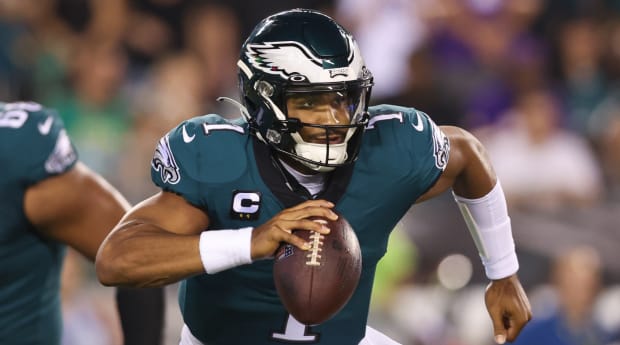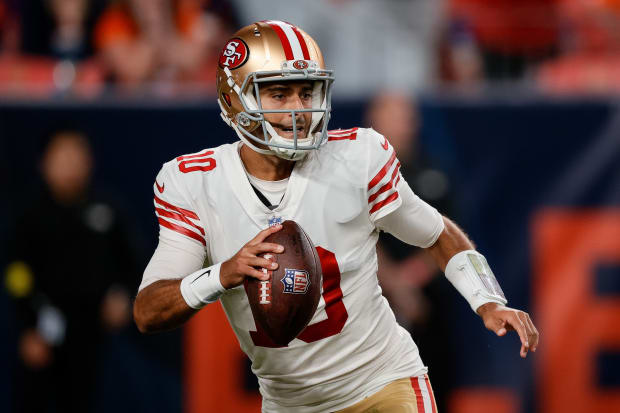The stark contrast between the two most recent quarterbacks for the Eagles was on full display in Washington last weekend.
At this time two years ago, there was no team more all-in on a young quarterback than the Eagles with Carson Wentz. They traded precious draft capital, including first- and second-round picks in consecutive drafts, to acquire him. They told their popular and successful backup, Super Bowl–winning quarterback Nick Foles, to seek employment elsewhere. They rewarded Wentz with a top-of-market contract for a young quarterback at the soonest point the CBA would allow. Wentz was the face of the franchise for the present and the future.
Even drafting Jalen Hurts in the second round of the 2020 draft was part of the overall Wentz commitment. I remember Eagles management telling me the Hurts pick was not just about liking Hurts, but about having an inexpensive—read: cheap—backup to Wentz, whose cash-and-cap numbers were about to explode. The Eagles have always paid close attention to present and future cap charges by position; this was a conscious decision to balance the quarterback position with a top-of-market starter and an inexpensive backup on a fixed and reasonable rookie contract.

Bill Streicher/USA TODAY Sports
That was then, and this is now.
I—like the Eagles—was completely wrong on Wentz; I thought he would be a star for more than a decade. Whether the issue was mental, emotional, physical or some combination, Wentz had as precipitous a fall from grace as I have seen in the sport, one so dramatic that the all-in Eagles became all-out. The cap-conscious Eagles did something I never thought they would do, incurring a then-record $34 million dead money cap charge to trade Wentz to the Colts (who traded him to the Commanders one year later). The story of his going from a solid candidate for NFL MVP to one of the worst starting quarterbacks in football will be a fascinating documentary one day. Last week—against, yes, the Eagles—he at times appeared to have no football awareness whatsoever.
Hurts, in contrast, has been a revelation and has turned into a budding star. I am not a scouting expert but can see traits that would make the Eagles feel incredibly secure at the most important position. His demeanor never changes; he has a stoic nature that will be important in good times and bad. He has great athleticism, strength and a willingness to learn and always get better. He may never have the arm strength of a Justin Herbert, Patrick Mahomes or Josh Allen, but he can be in their strata with his overall play. And, of course, those players—like Wentz—were top-10 picks.
Hurts now takes the mantle once held by Russell Wilson and then by Dak Prescott as the NFL’s most undervalued player. The Eagles—as the Seahawks and Cowboys before them—are receiving truly extraordinary value at the most important position. They are paying Hurts roughly $1 million while he’s playing at a level where players earn $30 million to $45 million. And with the Wentz dead money now off their cap, they have a massive advantage in cap construction of the team this year. Of course, that will change next year with a certain extension for Hurts—the earliest the CBA will allow is in February—but they are now managing the cap for that eventuality.
We cannot give Philadelphia too much credit for Hurts, however, as it was still checking out other options recently. Rumors swirled last year about the Eagles considering a potential trade for Deshaun Watson as well as this year about a potential trade for Russell Wilson. That interest seems misplaced now with the ascension of Hurts, but the team’s interest around those players was not a secret around the league.
Philadelphia has a strong team around Hurts at every position, anchored by its offensive and defensive lines, and is poised for sustained success. The centerpiece of that plan is a player drafted to support and back up Wentz, now two teams removed from the Eagles.
Meet the new boss, same as the old boss

Isaiah J. Downing/USA TODAY Sports
The 49ers and Jimmy Garoppolo can’t seem to quit each other. It is a marriage of convenience, one where they have stayed together largely through circumstance rather than intention.
Garoppolo was the face of the 49ers' recent past, leading them to last year’s NFC Championship Game and starting in a Super Bowl before that. Of course, he was never confused with the elite quarterbacks, but certainly more than competent in his role with the team and popular among teammates, fans and media. That popularity, however, did not fully extend to the team’s brain trust, as they chose another alternative in April of last year.
The 49ers mortgaged their future for Trey Lance, sending three first-round picks to acquire him as the third pick in the 2021 draft. They traded more compensation for him than teams do for all-pro players. The plan was a one-year apprenticeship for Lance—behind Garoppolo—before the 49ers turned the team over to him this year. That plan changed five quarters into the season when Lance broke his ankle.
Garoppolo has been on the trade market for the past seven months. During that time, several quarterbacks changed teams: The Colts chose Matt Ryan, the Falcons chose Marcus Mariota, the Panthers chose Baker Mayfield, the Browns chose Jacoby Brissett, the Steelers chose Mitch Trubisky, the Commanders chose Wentz, the Seahawks chose Drew Lock and Geno Smith. With no other options, Garoppolo and the 49ers realized they were better off together than apart, and he returned to the team on a reduced one-year contract.
Originally scheduled to make $25 million this year—something that was never going to happen whether with the 49ers or anyone else—he agreed to a restructured contract:
- $6.5 million salary
- $500,000 in per-game roster bonuses
- $250,000 for every game he has 25% playtime
- $100,000 per win in those games
- Postseason bonuses
Garoppolo should easily make the $500,000 in per-game bonuses, bringing him to $7 million. He should also easily make, barring injury, the $250,000 per game for 16 games, adding $4 million and bringing him to $11 million for the year. And the team should have some decent success; we can project 10 wins, adding another $1 million and bringing Garoppolo to compensation this year of $12 million, still less than half of what he was originally scheduled to earn.
Garoppolo now goes from a well-paid backup quarterback ($6.5 million) to a significantly underpaid starting quarterback ($12 million). The beneficiary of this, of course, is the 49ers, the team that tried (unsuccessfully) to trade him all offseason.
Garoppolo is in the same position in 2022 as he was in ’21, a placeholder for Lance. He will dutifully perform his role before yielding to Lance with the added opportunity of being a free agent in ’23.
Garoppolo and the 49ers are back together again. Meet the new boss, same as the old boss. And he will be the old boss again in six months.







